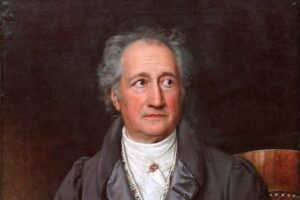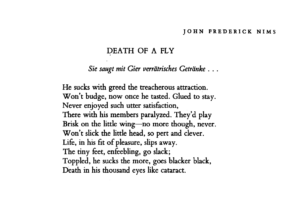
Johann Wolfgang von Goethe was a distinguished German poet, playwright, and novelist born in Frankfurt, Germany in 1789 and attended Leipzig University at the age of 16 in 1765 to study law. Though, he won accolades for his poetry, including his first collection of love poems titled Annette. Johann Wolfgang von Goethe survived through severe lung infections and suspected tuberculosis during which he wrote another collection called the Leipzig Songbook. His work seems to consistently reflect his experiences: Annette based on his love for an innkeepers daughter, Leipzig Songbook during his years of illness, Roman Elegies based on art he encountered during his time in Italy, and Hermann and Dorothea during the French Revolution and his cognitive dissonance between a bourgeois, peacefully complacent lifestyle or a revolutionary democratic lifestyle.
Most famously Goethe wrote Faust, influenced by Christopher Marlow’s play Doctor Faustus about a man who struggles with the limits of knowledge, power, and enjoyment and faces the offer of having a “good” Christian conscience by a good angel and a path of eternal damnation by an evil angel. The young scholar engages with the devil and it costs him his soul. The sources of inspiration are heavily derivative of society’s consideration of metaphysics, Christianity, and German Romanticism.
The Death of the Fly by Johann Wolfgang von Goethe:

Taking creative and analytic freedoms, The Death of the Fly can be read through a lens of greed, over consumption, and existentialism. It is interpreted that the fly gets a taste of something irresistible and decadently delicious, let us say it is a sweet bait in a fly trap. The fly cannot be removed or convinced to leave the trap as it has had a taste and must continue feasting and consuming at any cost. Bathing in the luxury of contentedness, the life of the fly is fleeting as his limbs and body begin to evanesce. The desire and greed grace his downfall.
Imagine we were to replace some words of the above summary to be congruent with overconsumption of fossil fuels and the destruction of the planet. Humans have become accustomed to the luxury of burning Earth’s finite materials. We cannot be removed or convinced to leave fossil fuels in the past, they are too sweet of a luxury. We consume at any cost. While countries in the core live happily and healthily, floods and natural disasters devastate island nations, melting sea ice leaves arctic animals stranded and without food, rivers like the Rhine see lower and lower levels from receding feeding glaciers, and so much more than mere death.
The Death of the Fly critiques the selfishness and blindness of beings whether it is that of an insect or that of a human. While Germany moves further and further away from fossil fuels there is still a dependence on coal and lignite coal, along with the rest of the world still heavily dependent on nonrenewable sources of energy.
Works Cited
Boyle, N. (2023, March 18). Johann Wolfgang von Goethe. Encyclopædia Britannica. Retrieved April 23, 2023, from https://www.britannica.com/biography/Johann-Wolfgang-von-Goethe
Poetry Foundation. (n.d.). Johann Wolfgang von Goethe. Poetry Foundation. Retrieved April 23, 2023, from https://www.poetryfoundation.org/poets/johann-wolfgang-von-goethe#tab-poems
